use to用法
useto的用法总结
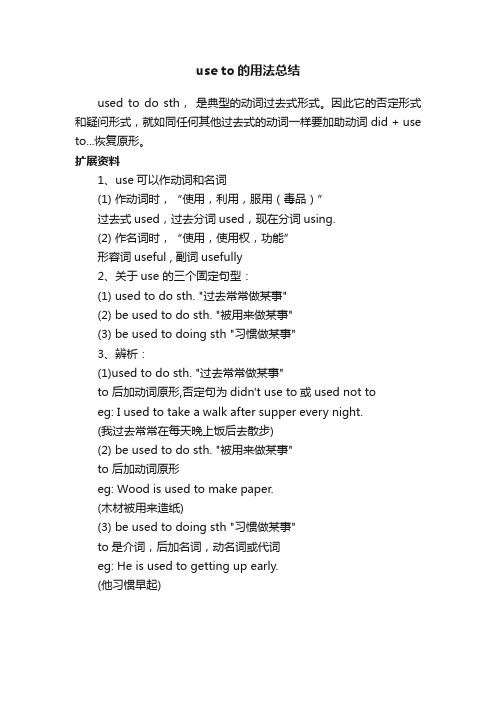
use to的用法总结
used to do sth,是典型的动词过去式形式。
因此它的否定形式和疑问形式,就如同任何其他过去式的动词一样要加助动词 did + use to...恢复原形。
扩展资料
1、use可以作动词和名词
(1) 作动词时,“使用,利用,服用(毒品)”
过去式used,过去分词used,现在分词using.
(2) 作名词时,“使用,使用权,功能”
形容词useful , 副词usefully
2、关于use 的三个固定句型:
(1) used to do sth. "过去常常做某事"
(2) be used to do sth. "被用来做某事"
(3) be used to doing sth "习惯做某事"
3、辨析:
(1)used to do sth. "过去常常做某事"
to 后加动词原形,否定句为didn't use to或used not to
eg: I used to take a walk after supper every night.
(我过去常常在每天晚上饭后去散步)
(2) be used to do sth. "被用来做某事"
to 后加动词原形
eg: Wood is used to make paper.
(木材被用来造纸)
(3) be used to doing sth "习惯做某事"
to是介词,后加名词,动名词或代词
eg: He is used to getting up early.
(他习惯早起)。
useto的用法总结
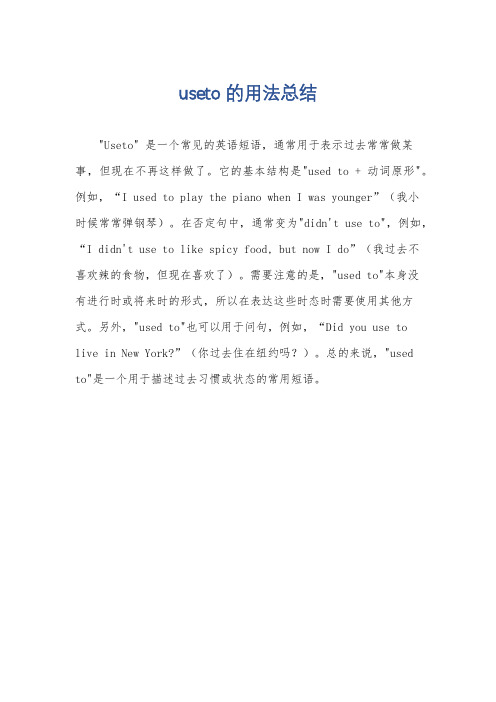
useto的用法总结
"Useto" 是一个常见的英语短语,通常用于表示过去常常做某事,但现在不再这样做了。
它的基本结构是"used to + 动词原形"。
例如,“I used to play the piano when I was younger”(我小
时候常常弹钢琴)。
在否定句中,通常变为"didn't use to",例如,“I didn't use to like spicy food, but now I do”(我过去不
喜欢辣的食物,但现在喜欢了)。
需要注意的是,"used to"本身没
有进行时或将来时的形式,所以在表达这些时态时需要使用其他方式。
另外,"used to"也可以用于问句,例如,“Did you use to live in New York?”(你过去住在纽约吗?)。
总的来说,"used to"是一个用于描述过去习惯或状态的常用短语。
use to使用详解
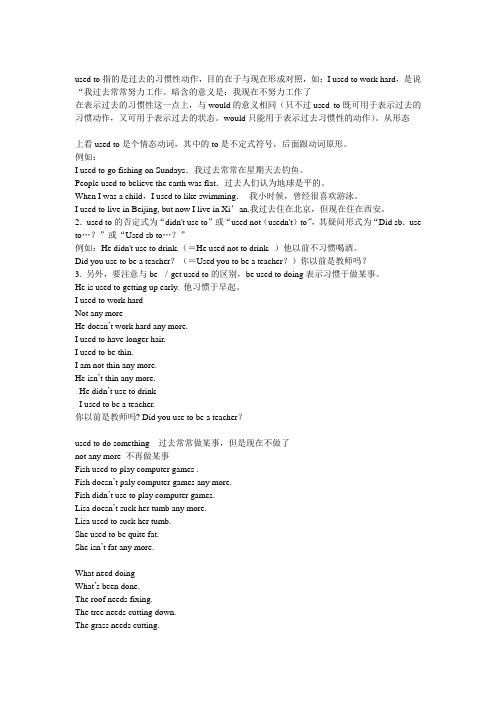
used to指的是过去的习惯性动作,目的在于与现在形成对照,如:I used to work hard,是说“我过去常常努力工作。
暗含的意义是:我现在不努力工作了在表示过去的习惯性这一点上,与would的意义相同(只不过used to既可用于表示过去的习惯动作,又可用于表示过去的状态。
would只能用于表示过去习惯性的动作)。
从形态上看used to是个情态动词,其中的to是不定式符号,后面跟动词原形。
例如:I used to go fishing on Sundays.我过去常常在星期天去钓鱼。
People used to believe the earth was flat.过去人们认为地球是平的。
When I was a child,I used to like swimming.我小时候,曾经很喜欢游泳。
I used to live in Beijing, but now I live in Xi’an.我过去住在北京,但现在住在西安。
2.used to的否定式为“didn't use to”或“used not(usedn't)to”,其疑问形式为“Did sb.use to…?”或“Used sb to…?”例如:He didn't use to drink.(=He used not to drink. )他以前不习惯喝酒。
Did you use to be a teacher?(=Used you to be a teacher?)你以前是教师吗?3. 另外,要注意与be /get used to的区别,be used to doing表示习惯于做某事。
He is used to getting up early. 他习惯于早起。
I used to work hardNot any moreHe doesn’t work hard any more.I used to have longer hair.I used to be thin.I am not thin any more.He isn’t thin any more.He didn’t use to drinkI used to be a teacher.你以前是教师吗? Did you use to be a teacher?used to do something 过去常常做某事,但是现在不做了not any more 不再做某事Fish used to play computer games .Fish doesn’t paly computer games any more.Fish didn’t use to play computer games.Lisa doesn’t suck her tumb any more.Lisa used to suck her tumb.She used to be quite fat.She isn’t fat any more.What need doingWhat’s been done.The roof needs fixing.The tree needs cutting down.The grass needs cutting.The windows need cleaning.The door needs replacing.The roof needs painting.The walls need painting.The fence needs replacing.The trash needs throwing away.The roof has been fixed.The tree has been cut down..The windows have been cleaned.The door has been replaced.The walls have been painted.The fence has been replaced.The trash has been thrown away.1. 本课主要讲的是用if和will来表达将来发生的事情。
used to 的用法及例句

used to 的用法及例句一、什么是used to在英语中,used to 是一个常用的短语,用来表达过去发生但现在已经停止的动作或状态。
它通常用于描述我们过去习惯做的事情,但现在不再这样做了。
本文将详细介绍used to 的用法,并给出相应例句。
二、Used to 的基本结构Used to 结构为 used + 动词原形,其中 used 是过去式的形式,在句子中可以充当行为或状态的主语、谓语、主语补足语等。
下面是一些例句以帮助读者更好地理解 used to 的基本结构。
1. 肯定句:I used to go swimming every Sunday.(我过去每个星期天都去游泳。
)2. 否定句:She didn't use to eat junk food.(她过去不吃垃圾食品。
)3. 疑问句:Did you use to watch this TV show?(你过去有看这个电视节目吗?)三、Used to 表达过去习惯性动作1. I used to play the piano.(我以前弹钢琴。
)2. He used to go fishing with his father in the summer.(他夏天曾经和他父亲一起钓鱼。
)3. We used to live in a small town.(我们过去住在一个小镇。
)4. They used to visit their grandparents every holiday.(他们每个假期都去看望他们的祖父母。
)四、Used to 表达过去的习惯状态1. She used to be afraid of heights.(她过去害怕高度。
)2. He used to have long hair when he was young.(他年轻的时候有一头长发。
)3. My parents used to drink coffee every morning.(我父母过去每天早上喝咖啡。
中考英语复习 语法:used to 的用法(讲义及练习)
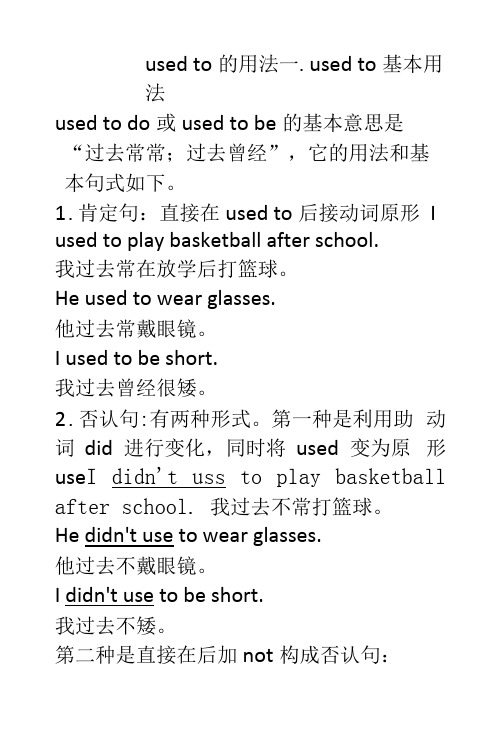
used to的用法一.used to基本用法used to do或used to be的基本意思是“过去常常;过去曾经”,它的用法和基本句式如下。
1.肯定句:直接在used to后接动词原形I used to play basketball after school.我过去常在放学后打篮球。
He used to wear glasses.他过去常戴眼镜。
I used to be short.我过去曾经很矮。
2.否认句:有两种形式。
第一种是利用助动词did进行变化,同时将used变为原形use I didn't uss to play basketball after school. 我过去不常打篮球。
He didn't use to wear glasses.他过去不戴眼镜。
I didn't use to be short.我过去不矮。
第二种是直接在后加not构成否认句:school.(改为否认句)Tom used to be a quiet boy.(改为一般疑问句并作否认回答)22.我过去常常和朋友们一起打棒球。
(翻译句子)There used to a stone bridge over the river. (be )The key:l.C2.B3.B4.D5.C5.B7.A8.B9.A10.A11. C 12.D 13.Bdidn/t he/ usedn't he14.MakingDrinking15.to cut/for cuttingPlaying16.fish/go fishingbe nervous about17.My brother didn't use to play soccer at school.或My brother usedn't to play soccer at school.18.Did Tom use to be a quiet boy, didn't he?No, he didn't.19.I used to play baseball with my friends.20.beI used not to play basketball after school. He used not to wear glasses.I used not to be short.3.一般疑问句:有两种形式,第一种是利用助动词did进行变化,同时把used 变为use,如:Did you use to play basketball after school? 你过去常在放学后打篮球吗?肯定回答:Yes, I did.否认回答:No, I didn't.Did he use to wear glasses?Yes, he did.No, he didn't.Did you use to be short?你过去矮吗?Yes, I did.No, I didn't.4.反义疑问句You used to be short, didn't you?你过去很矮,不是吗?Yes, I did.是的,我过去很矮。
used to的否定形式的使用技巧
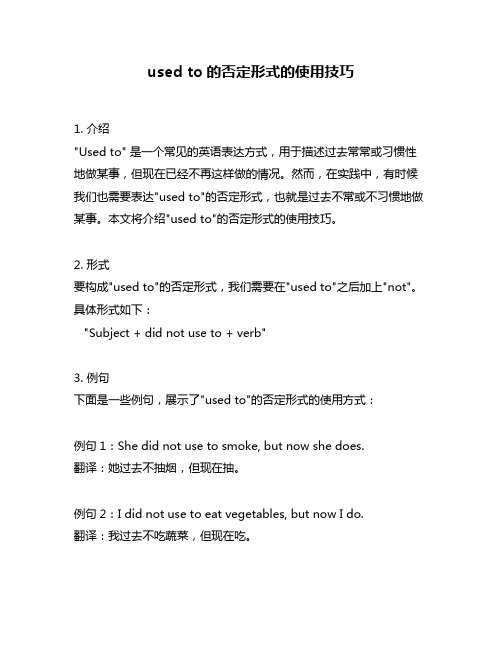
used to的否定形式的使用技巧1. 介绍"Used to" 是一个常见的英语表达方式,用于描述过去常常或习惯性地做某事,但现在已经不再这样做的情况。
然而,在实践中,有时候我们也需要表达"used to"的否定形式,也就是过去不常或不习惯地做某事。
本文将介绍"used to"的否定形式的使用技巧。
2. 形式要构成"used to"的否定形式,我们需要在"used to"之后加上"not"。
具体形式如下:"Subject + did not use to + verb"3. 例句下面是一些例句,展示了"used to"的否定形式的使用方式:例句1:She did not use to smoke, but now she does.翻译:她过去不抽烟,但现在抽。
例句2:I did not use to eat vegetables, but now I do.翻译:我过去不吃蔬菜,但现在吃。
例句3:They did not use to go jogging, but now they do.翻译:他们过去不去慢跑,但现在去。
4. 注意事项在使用"used to"的否定形式时,需要注意以下几点:4.1 主语和动词变化主语和动词在否定形式中的变化方式与肯定形式是一样的,只需要在"did not"与"use to"之间加上主语即可。
"I used to"的否定形式为"I did not use to"。
4.2 句子的时态"used to"的否定形式可用于任何时态,包括过去进行时、现在进行时和将来进行时等。
只需要在谓语动词前加上"did not",并根据需要改变谓语动词的时态即可。
uesd to 的用法
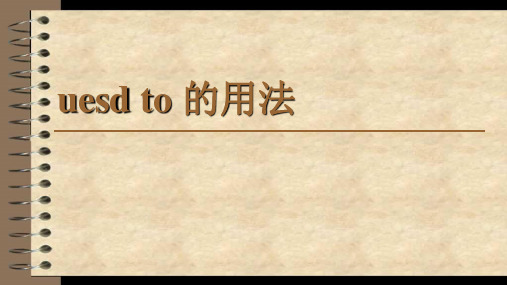
反义疑问句形式: 当陈述部分的谓语是used to时,疑问部分用“didn't + 主语”或“usedn't + 主语”。 答语:Yes, sb. did. / No, sb. didn't. 或 Yes, sb. uesd to. / No, sb. usedn't to.
eg: Tom used to be short, didn't he? Yes, he did. / No, he didn't. Mrs.White used to take a bus to work,usedn't she? Yes, she used to. / No, she usedn't to.
否定形式:didn't use to 或 usedn't to
eg: Her daughter didn't use to eat fruit. Her daughter usedn't to eat fruit.
过去不常......
一般疑问句形式: (1) Used sb. to do sth. ? Yes, sb. used to. / No, sb. usedn't to. (2) Did sb. use to do sth? Yes, sb. did. / No, sb. didn't. eg: Used your brother to play basketball ? Yes, he used to. / No, he usedn't to. Did Tom use to be a shy boy ? Yes, he did. / No, he didn't.
初中used to用法小结
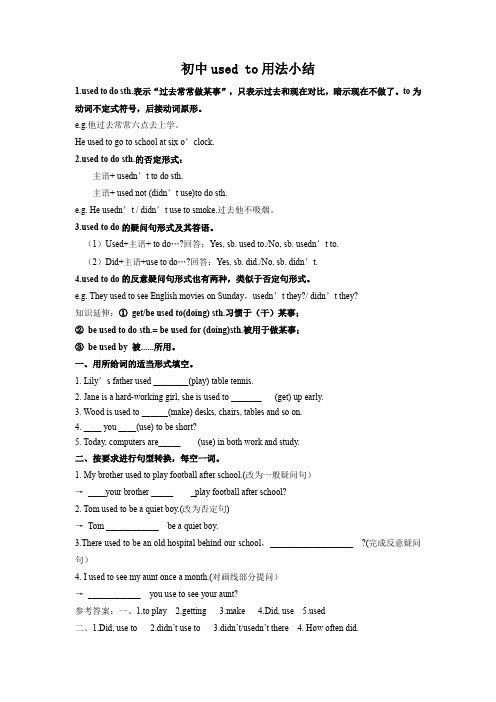
初中used to用法小结ed to do sth.表示“过去常常做某事”,只表示过去和现在对比,暗示现在不做了。
to为动词不定式符号,后接动词原形。
e.g.他过去常常六点去上学。
He used to go to school at six o’clock.ed to do sth.的否定形式:主语+ usedn’t to do sth.主语+ used not (didn’t use)to do sth.e.g. He usedn’t / didn’t use to smoke.过去他不吸烟。
ed to do的疑问句形式及其答语。
(1)Used+主语+ to do…?回答:Yes, sb. used to./No, sb. usedn’t to.(2)Did+主语+use to do…?回答:Yes, sb. did./No, sb. didn’t.ed to do的反意疑问句形式也有两种,类似于否定句形式。
e.g. They used to see English movies on Sunday,usedn’t they?/ didn’t they?知识延伸:①get/be used to(doing) sth.习惯于(干)某事;②be used to do sth.= be used for (doing)sth.被用于做某事;③be used by 被......所用。
一、用所给词的适当形式填空。
1. Lily’s father used ________(play) table tennis.2. Jane is a hard-working girl, she is used to _______ (get) up early.3. Wood is used to ______(make) desks, chairs, tables and so on.4. ____ you ____(use) to be short?5. Today, computers are_____ (use) in both work and study.二、按要求进行句型转换,每空一词。
usedto和beusedto的区别
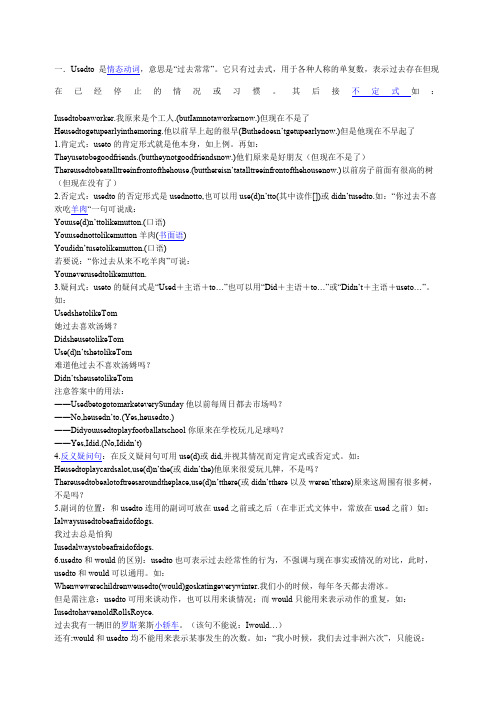
一.Usedto是情态动词,意思是“过去常常”。
它只有过去式,用于各种人称的单复数,表示过去存在但现在已经停止的情况或习惯。
其后接不定式如:Iusedtobeaworker.我原来是个工人.(butIamnotaworkernow.)但现在不是了Heusedtogetupearlyinthemoring.他以前早上起的很早(Buthedoesn’tgetupearlynow.)但是他现在不早起了1.肯定式:useto的肯定形式就是他本身,如上例。
再如:Theyusetobegoodfriends.(buttheynotgoodfriendsnow.)他们原来是好朋友(但现在不是了)Thereusedtobeatalltreeinfrontofthehouse.(butthereisn’tatalltreeinfrontofthehousenow.)以前房子前面有很高的树(但现在没有了)2.否定式:usedto的否定形式是usednotto,也可以用use(d)n’tto(其中读作[])或didn’tusedto.如:“你过去不喜欢吃羊肉“一句可说成:Youuse(d)n’ttolikemutton.(口语)Youusednottolikemutton羊肉(书面语)Youdidn’tusetolikemutton.(口语)若要说:“你过去从来不吃羊肉”可说:Youneverusedtolikemutton.3.疑问式:useto的疑问式是“Used+主语+to…”也可以用“Did+主语+to…”或“Didn’t+主语+useto…”。
如:UsedshetolikeTom她过去喜欢汤姆?DidsheusetolikeTomUse(d)n’tshetolikeTom难道他过去不喜欢汤姆吗?Didn’tsheusetolikeTom注意答案中的用法:――UsedbetogotomarketeverySunday他以前每周日都去市场吗?――No,heusedn’to.(Yes,heusedto.)――Didyouusedtoplayfootballatschool你原来在学校玩儿足球吗?――Yes,Idid.(No,Ididn’t)4.反义疑问句:在反义疑问句可用use(d)或did,并视其情况而定肯定式或否定式。
use的过去式和用法例句
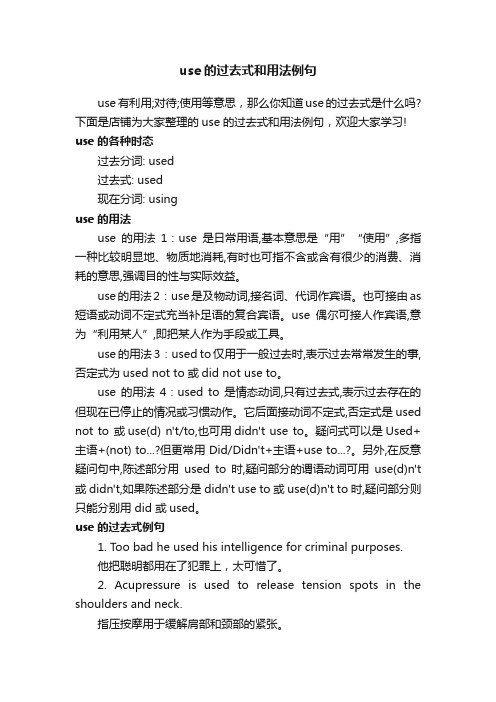
use的过去式和用法例句use有利用;对待;使用等意思,那么你知道use的过去式是什么吗?下面是店铺为大家整理的use的过去式和用法例句,欢迎大家学习! use的各种时态过去分词: used过去式: used现在分词: usinguse的用法use的用法1:use是日常用语,基本意思是“用”“使用”,多指一种比较明显地、物质地消耗,有时也可指不含或含有很少的消费、消耗的意思,强调目的性与实际效益。
use的用法2:use是及物动词,接名词、代词作宾语。
也可接由as 短语或动词不定式充当补足语的复合宾语。
use偶尔可接人作宾语,意为“利用某人”,即把某人作为手段或工具。
use的用法3:used to仅用于一般过去时,表示过去常常发生的事,否定式为used not to或did not use to。
use的用法4:used to是情态动词,只有过去式,表示过去存在的但现在已停止的情况或习惯动作。
它后面接动词不定式,否定式是 used not to 或use(d) n't/to,也可用didn't use to。
疑问式可以是Used+主语+(not) to...?但更常用 Did/Didn't+主语+use to...?。
另外,在反意疑问句中,陈述部分用used to时,疑问部分的谓语动词可用use(d)n't 或 didn't,如果陈述部分是 didn't use to 或use(d)n't to时,疑问部分则只能分别用 did 或used。
use的过去式例句1. Too bad he used his intelligence for criminal purposes.他把聪明都用在了犯罪上,太可惜了。
2. Acupressure is used to release tension spots in the shoulders and neck.指压按摩用于缓解肩部和颈部的紧张。
used to与would的用法总结(推荐15篇)
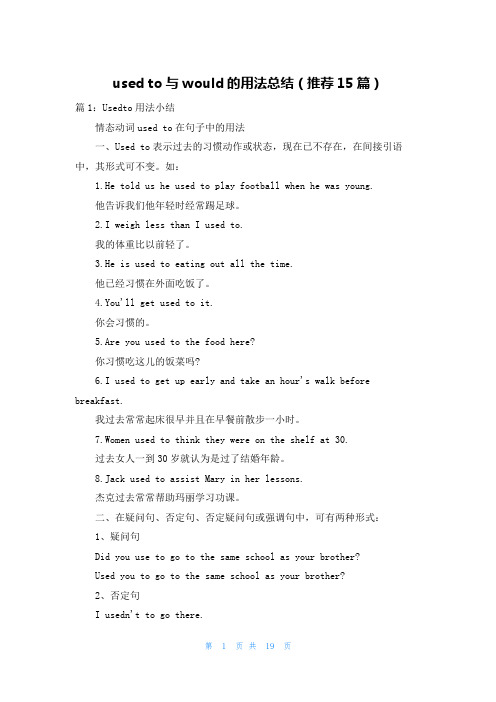
used to与would的用法总结(推荐15篇)篇1:Usedto用法小结情态动词used to在句子中的用法一、Used to表示过去的习惯动作或状态,现在已不存在,在间接引语中,其形式可不变。
如:1.He told us he used to play football when he was young.他告诉我们他年轻时经常踢足球。
2.I weigh less than I used to.我的体重比以前轻了。
3.He is used to eating out all the time.他已经习惯在外面吃饭了。
4.You'll get used to it.你会习惯的。
5.Are you used to the food here?你习惯吃这儿的饭菜吗?6.I used to get up early and take an hour's walk before breakfast.我过去常常起床很早并且在早餐前散步一小时。
7.Women used to think they were on the shelf at 30.过去女人一到30岁就认为是过了结婚年龄。
8.Jack used to assist Mary in her lessons.杰克过去常常帮助玛丽学习功课。
二、在疑问句、否定句、否定疑问句或强调句中,可有两种形式:1、疑问句Did you use to go to the same school as your brother?Used you to go to the same school as your brother?2、否定句I usedn't to go there.I didn't use to go there.3、否定疑问句Usen't you to be interested in the theatre?Didn't you use to be interested in the theatre?4、强调句I certainly used to smoke,but it was a long time ago.I certainly did use to smoke,but it was a long time ago.5、其反意疑问句或简略回答中,也有两种形式:She used to be very fat,didn't she? (口语+常用)/ use(d)n't she? (正式+过时)Did you use to play chess? Yes,I did.Used you to get up early in the morning? Yes,I did. (Yes,I used to.)Used to 用法小结01 一、掌握used to的构成used to+动词原形,其中to是不定式符号02 二、掌握used to用法。
Usedto用法小结

Usedto用法小结Used to是英语中一个常用的结构,表示过去经常做的事情,现在不再做了,相当于中文中的“过去经常”,其基本形式为used to + 动词原形,有时也可用would + 动词原形来表示。
下面是used to用法的小结。
【语法结构】一般将used to视为一个动词短语,由used与to组成。
used to作为一个辅助动词用于表示过去的习惯或经常性行为。
在使用过程中,used to后面的动词一般使用原形,而不使用-ing形式。
肯定句:主语 + used to + 动词原形例如:I used to go to the gym every morning.我过去经常去健身房。
She used to play the piano when she was young.她年轻的时候经常弹钢琴。
否定句:主语 + didn't use to + 动词原形例如:I didn't use to watch TV before going to bed.我以前不在睡觉前看电视。
She didn't use to eat meat, but now she does. 她以前不吃肉,但现在吃了。
疑问句:Did + 主语 + use to + 动词原形?例如:Did you use to take the bus to work?你过去经常坐公交车上班吗?Did she use to live in New York City?她过去住在纽约吗?【常见用法】1. 表示过去的经常性或习惯性动作例如:I used to smoke, but I gave it up.我过去常吸烟,但我戒了。
He used to be a teacher, but now he is a writer.他过去是一名教师,但现在是一名作家。
2. 表示过去的做法或状态例如:She used to live in a small apartment.她以前住在一个小公寓里。
use to 和be used to 的用法
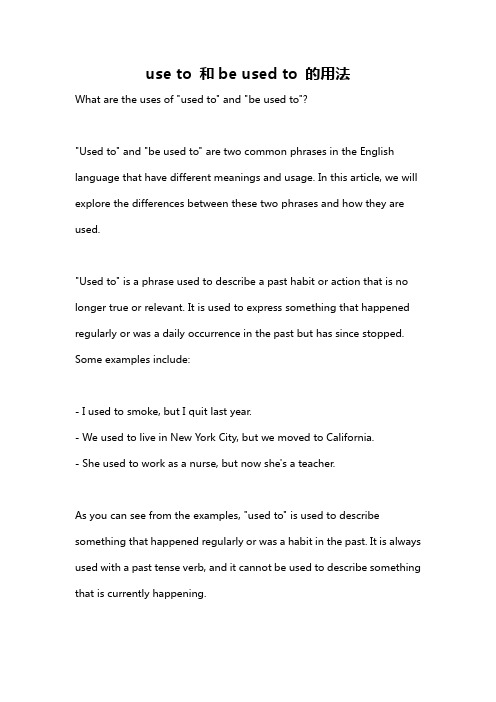
use to 和be used to 的用法What are the uses of "used to" and "be used to"?"Used to" and "be used to" are two common phrases in the English language that have different meanings and usage. In this article, we will explore the differences between these two phrases and how they are used."Used to" is a phrase used to describe a past habit or action that is no longer true or relevant. It is used to express something that happened regularly or was a daily occurrence in the past but has since stopped. Some examples include:- I used to smoke, but I quit last year.- We used to live in New York City, but we moved to California.- She used to work as a nurse, but now she's a teacher.As you can see from the examples, "used to" is used to describe something that happened regularly or was a habit in the past. It is always used with a past tense verb, and it cannot be used to describe something that is currently happening.On the other hand, "be used to" is used to describe a current familiarity or comfort level with something. It is used to express that someone is accustomed to something, or that it is not new or strange for them. Some examples include:- I'm used to getting up early because of my job.- He's used to cold weather because he grew up in Canada.- They're used to eating spicy food because they're from Thailand.In these examples, "be used to" is followed by a gerund or a noun phrase, and it is used to describe something that is currently happening or has become a habit. It is often used in the present tense, but it can also be used in the past or future tense.Now that we understand the basic differences between "used to" and "be used to", let's explore some more specific examples and usage.Examples of "used to"1. I used to play soccer when I was in high school.2. She used to live in Paris, but she moved to London.3. They used to go camping every summer, but now they prefer beachvacations.4. Jim used to be a heavy drinker, but he's been sober for five years.In each of these examples, "used to" is followed by a verb in the past tense. The phrase is used to describe a past habit or action that is no longer true or relevant.Examples of "be used to"1. I'm used to driving on the left side of the road because I'm from England.2. She's used to working long hours because she's a nurse.3. They're used to the noise because they live in a busy city.4. He'll be used to the heat by the end of the week.In these examples, "be used to" is followed by a gerund or noun phrase, and it is used to describe a current familiarity or comfort level with something. In the last example, it is used to describe a future familiarity or comfort level.Some additional notes on usage:- "Used to" is always followed by a verb in the past tense. It cannot be used with the present tense or future tense.- "Be used to" is often used with the present tense, but it can also be used with the past or future tense.- "Used to" describes a past habit or action that is no longer true or relevant. "Be used to" describes a current familiarity or comfort level with something.In conclusion, "used to" and "be used to" are two important phrases in the English language that have different meanings and usage. Understanding the differences between these two phrases can help you communicate more effectively in both written and spoken English.。
use---to- - -造句
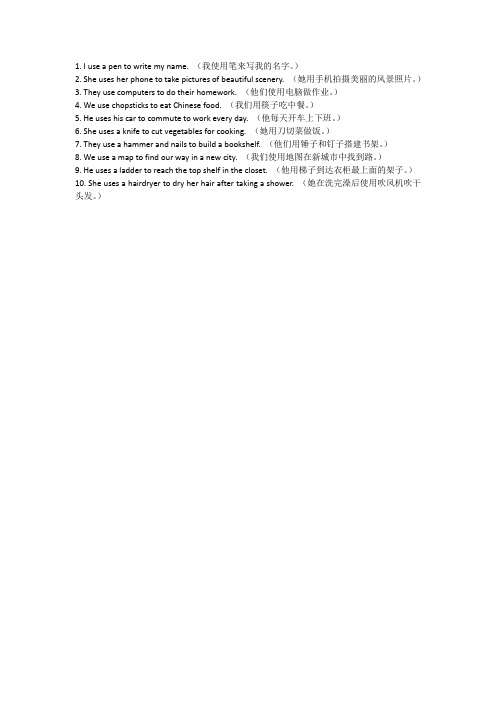
1. I use a pen to write my name. (我使用笔来写我的名字。
)
2. She uses her phone to take pictures of beautiful scenery. (她用手机拍摄美丽的风景照片。
)
3. They use computers to do their homework. (他们使用电脑做作业。
)
4. We use chopsticks to eat Chinese food. (我们用筷子吃中餐。
)
5. He uses his car to commute to work every day. (他每天开车上下班。
)
6. She uses a knife to cut vegetables for cooking. (她用刀切菜做饭。
)
7. They use a hammer and nails to build a bookshelf. (他们用锤子和钉子搭建书架。
)
8. We use a map to find our way in a new city. (我们使用地图在新城市中找到路。
)
9. He uses a ladder to reach the top shelf in the closet. (他用梯子到达衣柜最上面的架子。
)
10. She uses a hairdryer to dry her hair after taking a shower. (她在洗完澡后使用吹风机吹干头发。
)。
use 用法总结
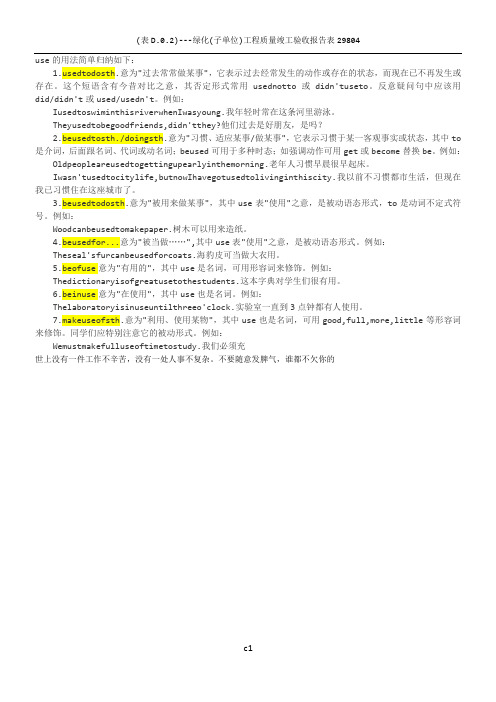
(表D.0.2)---绿化(子单位)工程质量竣工验收报告表29804use的用法简单归纳如下:edtodosth.意为"过去常常做某事",它表示过去经常发生的动作或存在的状态,而现在已不再发生或存在。
这个短语含有今昔对比之意,其否定形式常用usednotto或didn'tuseto。
反意疑问句中应该用did/didn't或used/usedn't。
例如:IusedtoswiminthisriverwhenIwasyoung.我年轻时常在这条河里游泳。
Theyusedtobegoodfriends,didn'tthey?他们过去是好朋友,是吗?2.beusedtosth./doingsth.意为"习惯、适应某事/做某事",它表示习惯于某一客观事实或状态,其中to 是介词,后面跟名词、代词或动名词;beused可用于多种时态;如强调动作可用get或become替换be。
例如:Oldpeopleareusedtogettingupearlyinthemorning.老年人习惯早晨很早起床。
Iwasn'tusedtocitylife,butnowIhavegotusedtolivinginthiscity.我以前不习惯都市生活,但现在我已习惯住在这座城市了。
3.beusedtodosth.意为"被用来做某事",其中use表"使用"之意,是被动语态形式,to是动词不定式符号。
例如:Woodcanbeusedtomakepaper.树木可以用来造纸。
4.beusedfor...意为"被当做……",其中use表"使用"之意,是被动语态形式。
例如:Theseal'sfurcanbeusedforcoats.海豹皮可当做大衣用。
5.beofuse意为"有用的",其中use是名词,可用形容词来修饰。
- 1、下载文档前请自行甄别文档内容的完整性,平台不提供额外的编辑、内容补充、找答案等附加服务。
- 2、"仅部分预览"的文档,不可在线预览部分如存在完整性等问题,可反馈申请退款(可完整预览的文档不适用该条件!)。
- 3、如文档侵犯您的权益,请联系客服反馈,我们会尽快为您处理(人工客服工作时间:9:00-18:30)。
F: That's too bad. Exercise is really important.
M: I know. I'm getting a little fat. I didn't use to be this heavy.
F: Well, I'm going swimming tonight. Do you want to go with me?
M: They used to exercise in high school.
F: Did they use to exercise in high school?
M: Henry used to run in high school.
F: Did Henry use to run in high school?
M: He used to swim in a river.
F: Where did he use to swim?
M: She used to work in the factory.
F: Where did she use to work?
M: They used to play volleyball in their backyard.
现在我们把这段对话用慢速度再念一遍, 请注意听.
M: Susan, what do you do for exercise?
F: I go swimming once a week.
M: I used to swim in high school, but I don't have time anymore.
M: Okay. I really need to get in shape again.
现在我们把刚才那段会话里包含了今天要学的语法, 也就是有 used to 跟有动 词加上 to 再加上动词的句子挑出来用慢速度再念一遍给你听.
M: I used to swim in high school.
F: Henry likes to make fancy dishes on weekends.
M: Henry likes to invite friends on weekends.
F: Henry likes to invite friends on weekends.
除了 like 这个动词, 其他动词, 比方: love, l-o-v-e, love, want, w-a-n-t, want, plan, p-l-a-n, plan, try, t-r-y, try, need, n-e-e-d, need, prefer, p-r-e-f-e-r, prefer, 都可以这样用. 现在我们用这些动词来作换字练习. 首先举个例子:
F: Did she use to play basketball in high school?
M: You used to play volleyball in high school.
F: Did you use to play volleyball in high school?
M: to play volleyball
F: I used to play volleyball in high school.
M: to exercise
F: I used to exercise in high school.
M: to run
F: I used to run in high school.
M: at seven o'clock
F: He used to get up at seven o'clock.
M: When did she use to have a lot of time?
M: after school
F: She used to have a lot of time after school.
F: I used to play basketball in high school.
好, 现在我们开始. 在学生做练习的时候, 请你也一起做.
M: I used to swim in high school.
M: to play basketball
F: I used to play basketball in high school.
F: Where did they use to play volleyball?
M: Susan used to run in the park.
F: Where did Susan use to run?
现在我们再换一个方式来做练习. 先由老师用 when, w-h-e-n, when这个字, 问一 个有 used to 这个词组的问句, 接着老师提出一个说明时间的词组, 请你用时间 词组来回答问题. 首先举个例子:
F: He used to sit next to me in school.
M: Susan used to drink a lot of milk.
F: Susan used to drink a lot of milk.
M: She used to live far from the store.
M: Henry likes to cook his own dinner on weekends.
F: Henry likes to cook his own dinner on weekends.
M: Henry likes to make fancy dishes on weekends.
F: She used to live far from the store.
M: Henry and Kate used to go to small parties.
F: Henry and Kate used to go to small parties.
M: They used to go out to eat.
F: They used to go out to eat.
下面我们来作换字练习. 先由老师念一个有 used to 这个词组的句子, 接着老师 念一个短语, 学生就把这个短语换进句子里. 现在先举个例子:
M: I used to swim in high school.
M: to play basketball
M: I didn't use to be this heavy.
F: Do you want to go with me?
M: I really need to get in shape again.
二. USED TO
首先我们练习 used to 的用法. 这个词组是表示过去常常做一件事而现在不再 做了.
现在我们来做练习. 由老师念一个有 used to 这个词组的句子,叫学生把这些句 子改为问句. 现在请你注意听.
M: He used to swim in high school.
F: Did he use to swim in high school?
M: She used to play basketball in high school.
M: Susan, what do you do for exercise?
F: I go swimming once a week.
M: I used to swim in high school, but I don't have time anymore.
F: That's too bad. Exercise is really important.
好了, 现在我们看一看怎么样把 He used to swim in high school. 变成问句. 在把 这个句子变成问句的时候必须用did, d-i-d, did 开头,于是这句话就变成了Did he use to swim in high school? 再举一个例子: 把 She used to exercise in high school. 这句话变成问句, 就要这样说: Did she use to exercise in high school?
M: I know. I'm getting a little fat. I didn't use to be this heavy.
F: Well, I'm going swimming tonight. Do you want to go with me?
M: Okay. I really need to get in shape again.
M: When did he use to get up?
M: at seven o'clock
F: He used to get up at seven o'clock.
现在我们正式开始. 在你回答之后, 还是请你听我们的正确答案.
M: When did he use to get up?
一.本课要点及示例
今天我们要练习两个词组, 一个是 used to, u-s-e-d t-o, used to, 另外一个是动词 加上 to, t-o, to 再加上动词, 也就是 like to do 和 want to go 等等的动词短语.
首先请你听一段对话, 内容是说 Henry 跟他表妹 Susan 在谈做运动. 我们先把 这段对话用正常速度念一遍, 请你注意正确的发音跟语调的抑扬顿挫.
现在我们换一个方法作练习.由老师念一个句子,请你用where, w-h-e-r-e, where 这个字, 把句子改成问句. 首先还是举个例子:
